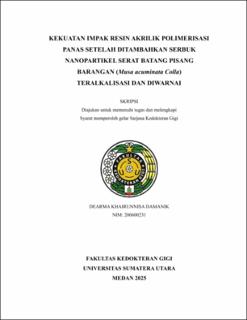Kekuatan Impak Resin Akrilik Polimerisasi Panas setelah Ditambahkan Serbuk Nanopartikel Serat Batang Pisang Barangan (Musa Acuminata Colla) Teralkalisasi dan Diwarnai
Impact Strength of Heat-Cured Acrylic Resin after The Addition Of Alkalized and Dyed Nanoparticle Powder of Barangan Banana Stem (Musa Acuminata Colla)

Date
2025Author
Damanik, Dearma Khairunnisa
Advisor(s)
Harahap, Sefty Aryani
Metadata
Show full item recordAbstract
Heat-cured acrylic resin as a denture base that is potentially subject to sudden impacts, such as falling while cleaning dentures. To prevent the possibility of easy fracture due to impact, it is necessary to increase the impact strength of acrylic resin. One of the ways is to add reinforcing materials such as natural fibers. The addition of natural fibers, such as banana stem fibers, as a reinforcement for acrylic resin is expected to improve and enhance the mechanical properties, thus strengthening the resistance of acrylic resin to impact. The purpose of this study was to determine the difference in impact strength of heat-cured acrylic resin after the addition of alkalized and dyed barangan banana stem fiber nanoparticle powder (Musa acuminata Colla) at concentrations of 0.5%, 1%, and 1.5% weight.
The research samples were made of heat-cured acrylic resin 80x10x4 mm as many as 10 pieces for each treatment group, namely, the group without fiber powder addition (I), the group added fiber powder with 0.5% weight (II), fiber powder 1% weight (III) and fiber powder 1.5% weight (IV) with ratio of fiber powder: polymer: monomer, namely 0.025 gr: 4.975 gr: 2.5 ml (II), 0.05 gr: 4.95 gr: 2.5 ml (III), and 0.075 gr: 4.925 gr: 2.5 ml (IV). The fibers were taken from the middle part of the banana stem, alkalized with 5% NaOH at a temperature of 25oC for 1 hour, then dyed with 15% red dragon fruit extract, ground, dried, and underwent the ball milling process to obtain nanoparticle size. Nanoparticle powder was added to the resin powder and mixed with monomer liquid, packaged, then cured, then the sample was polished and finalized. Impact strength was tested using a Charpy impact tester with a swing angle of 150o and a hammer mass of 0.71 kg.
The mean and standard deviation of impact strength values in groups I, II, III, and IV were 0.0095±0.0019 J/mm2, 0.0131±0.0032 J/mm2, 0.0139±0.0035 J/mm2, 0.0145±0.0026 J/mm2, respectively. ANOVA statistical test showed that there was a significant difference in impact strength in heat-cured acrylic resin after the addition of 0.5%, 1%, and 1.5% weight of barangan banana stem fiber powder with p-value of 0.002 (p <0.05). Post-hoc test showed that there was a significant difference (p <0.05) between groups with and without addition. It can be concluded that the impact strength of heat-cured acrylic resin increases with the addition of nanoparticle powder of barangan banana stem fiber and the addition of 1.5% weight is the powder concentration with the highest impact value.
Collections
- Undergraduate Theses [1985]
